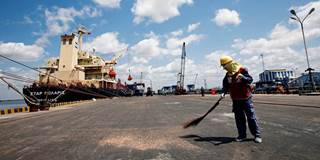After a year of escalating trade conflicts, the world must not forget that open trade has been a key engine of economic growth and poverty reduction in recent decades. With the global economy now entering a broad slowdown, measures to expand economic opportunity through trade have become all the more important.
WASHINGTON, DC – Just when poverty-reduction efforts around the world were already slowing, recent forecasts indicate that the global economy is heading into a period of deepening uncertainty. That makes measures to boost growth and expand economic opportunity all the more urgent – which is why revitalizing trade must be high on the global policy agenda. The evidence is clear: as an engine of economic growth and a critical tool for combating poverty, trade works.

WASHINGTON, DC – Just when poverty-reduction efforts around the world were already slowing, recent forecasts indicate that the global economy is heading into a period of deepening uncertainty. That makes measures to boost growth and expand economic opportunity all the more urgent – which is why revitalizing trade must be high on the global policy agenda. The evidence is clear: as an engine of economic growth and a critical tool for combating poverty, trade works.